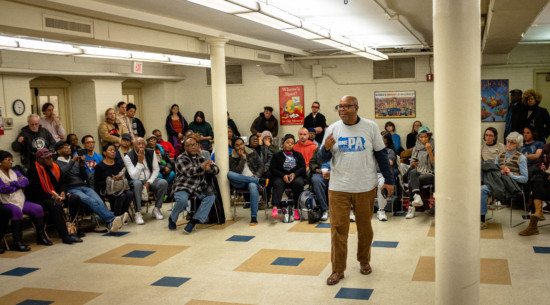
Greg Benjamin, the 51st Ward leader, and co-organizer of Saturday’s community conversation on gentrification.
A standing-room-only crowd packed the basement community room in the Kingsessing branch of the Free Library on Saturday afternoon to start what organizers hope will be an ongoing conversation about gentrification.
“All eyes are on Southwest Philadelphia now. We have four trolley lines, four bus lines,” said Greg Benjamin, an organizer of the meeting and candidate for the state legislature. “We have the opportunity to set an example for what wasn’t done right in other places.”
Benjamin and other organizers said Saturday’s meeting will be the first in a series of conversations intended to find common ground across racial and economic lines to help prevent the broad displacement that has followed gentrification in other West Philly neighborhoods as well as other parts of the city.
This first meeting was framed as an honest discussion of the economic and cultural impact of the influx of new capital and residents into neighborhoods other families have lived in for generations. Meeting organizers, who included Benjamin, local parent and sociology professor Christina Jackson and Drick Boyd, a community educator and professor emeritus at Eastern University, encouraged people to speak frankly about the impact that the changes have had on them.
Comments ranged from simple requests from older, African American residents to folks new to the neighborhood to just be neighborly – doing just simple things like saying “hello” or even nodding.
“At times you feel disrespected,” said one woman who has lived in the neighborhood since 1966. “My father taught me that a nod doesn’t hurt anyone. Nod that head. If you can’t open that mouth, nod that head.”
Another said: “If you walk by somebody and you’re too busy on your phone to say hello, then that’s an insult to humanity; not just your neighbor.”
Much of the conversation focused on the economic impacts, which typically drive displacement and demographic changes. These changes are already evident in nearby Cedar Park.
“I have been here 30 years and I don’t know if I’m going to make it much longer if my taxes keep going up,” said one resident. “Will gentrification improve our healthcare or our education system? I don’t know.”
A key outcome of the meeting was the commitment by many in the room to work toward policy changes – like increased low-income housing – that could help lessen the impact of gentrification without blaming people for buying homes. Those in attendance discussed measures that would help offset other policies, like tax incentives, that have helped spur gentrification. One resident mentioned the short-sited courting of development in the past without plans in place to help residents who wanted to stay.
“I don’t see gentrification as an individual problem,” said one resident who grew up in Kingsessing. “I don’t blame you for buying a home where you can afford to buy. For me the problem is when gentrification becomes public policy.”
Those in attendance even agreed to work on symbolic measures together, like getting together to create artful signs that everyone in the neighborhood could put on their doors to let speculators know their house isn’t for sale. Or, to pull down the pesky and illegal “We Buy Houses” signs.
Organizers promised to schedule another meeting soon to continue the conversation and devise action steps.






November 25th, 2019 at 11:01 pm
The residents of Philadelphia keep voting for the City to spend MORE MONEY. This requires MORE TAXES.
Currently ALL Landlords are required to spend @ $200 per rental unit to certify it as Lead-Safe. City Council just voted to provide Legal council to all non-paying tenants being evicted.
There is a bill that comes due for these “good intentions”.
If you don’t want your taxes to go up, if you don’t want your rent to go up, DON’T VOTE FOR CANDIDATES WHO WANT THE GOVERNMENT TO DO MORE!!!
November 26th, 2019 at 11:26 am
It seems that gentrification has increased our property value. My home value has double over the past five years. I live on the Baltimore Ave corridor which is just the beginning of southwest. My taxes actually went down because I’m a senior citizen. Besides the increases value of my property I’ve seen improved street lighting, new shops and restaurants. Cobb’s Creek Park is also undergoing improvement.
November 26th, 2019 at 12:21 pm
The session was facilitated by 3 very good community workers, one a respected ward leader. They certainly affirmed that what we call Gentrification has very different implications, depending on social position. They affirmed all people, including homeowners, contractors and developers, as each having unique and important perspectives.
November 26th, 2019 at 1:43 pm
I think as a major way of improving our neighborhood and our environment is to ban people leaving the bags of coupons around. Not only does it make the neighborhood look messy it also is a waste of paper and plastic. All of which is non recyclable and goes to landfills. I think that, regardless of how much money people have/ dont have, having a clean litter free environment tells alot about the people, and the community. Use the tax money to pay for street sweepers, garbage cans, etcetera.
November 27th, 2019 at 8:30 pm
Thank you, American Dream, we appreciate your acknowledgement of affirmations:) More to come!